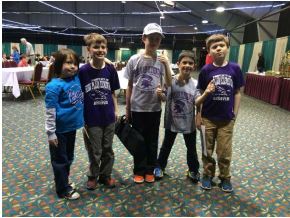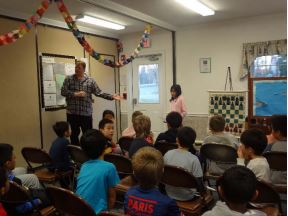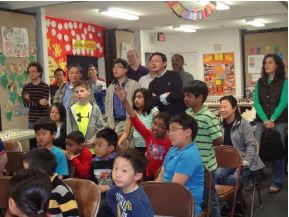After seven years in Singapore, I relocated back to Massachusetts in 2013 with my wife and two children. By then and without any particular unique ability or interest, four-year old Bryan had figured out that chess was something his dad paid attention to, although he was too young to go with me to meet Kasparov when he visited Singapore in 2010. Bryan learned the names of the pieces, how to make legal moves, and some basic checkmates. We played at home and he seemed to enjoy it and finally got good enough to beat his mom regularly. When his attention span would allow, I steered toward game positions where he could play favorable and winning tactics so he could stay interested in playing old dad.
In the Spring of 2014, Bryan took a beginner chess class on Sundays in Winchester at his Chinese School with A-player Rick Lunetta, who recommended the Winchester Chess Club, close by to Woburn where we then lived. This proved to be exactly the right club for Bryan. Most of the players were scholastic-age players, and the club was well established under the long-time leadership of Tom Richardson and David Plantamura. There were plenty of beginners and novices, and club events were geared toward the juniors playing there. Bryan was having great fun and probably the chess part was secondary – being in a peer group of junior chess players where he could mix with the older kids had great appeal.
A few months later, I entered him in an unrated tournament at Stoughton Library. We had the talk on the drive down about the likely possibility that he would lose all of his games and we could simply go home any time if he was not having any fun. Little else could be expected of a 5-year old pre-schooler playing his first tournament in a K-5 section? I was quite surprised when he finished 4.5/7 but I was under no illusions – this was not a USCF quality event and neither were most of the players, even by scholastic standards. And so later that month, he became a USCF and MACA member and entered a K-3 U400 tournament at the 2014 Mass Open – his first rated tournament. His 2-2 earned him a provisional rating of 281 and he spent a few tournaments getting organized with juggling notation, playing with a clock, surviving the moves of his more experienced and older opponents, and learning some of the rules of tournament play. In his second tournament in Concord, he allowed his opponent to illegally castle out of checkmate, and burst into tears when he realized it after the game.
Later that summer, my family bought a house in Andover, and we continued to frequent the Winchester Club on Friday nights, but the 25- mile roundtrip drive became a factor. We were committed to staying in Andover for a good while, so of course we would simply join the Andover Chess Club.
Except that there wasn’t one – a fact that was not lost on a small group of Andover locals who were also interested in having a chess club in town. We got together one night at the library discussed what a chess club would be and we pretty much faced the initial big issues that anyone thinking about starting a chess club is going to face: Where do we play? When should we meet? And how do we get started? What kind of club are we?
The first question was always the most important. As a brand new not-for-profit club on a budget of zero dollars, getting donated meeting space was paramount, which ruled out the Elk’s Lodges and VFWs in the area. I made a list of churches in Andover, and fellow Andover parent Wayne Huang suggested the Faith Lutheran Church, just down the street from his son’s school. It was my first and only phone call, a testament to fantastic luck and the accommodating nature of the pastors at the church. Friday nights seemed the best fit – it was popular in Winchester and could be popular in Andover -- a good night to do something fun before getting the weekend fully started. And so it was: Friday nights were to be reserved for the Andover Chess Club (ACC) and we agreed to start in January 2015, and initially go for 6 months to see how it progressed.
The next item was equipment. The Living Memorial Chess Fund and MACA came through with a grant of 10 sets and boards. I bought a demo board and tripod, made some fliers for the local library. I introduced myself to the local newspaper, the Andover Townsman, which was more than happy to communicate the existence of the club right before the first meeting by pretending my living room was the actual club so the photographer could come in. My wife navigated the Andover Moms website to let everyone know about the club. I reached out to some of the public schools in the area and found the parent volunteers running before/after school chess programs and handed out fliers at a chess class taught by IM Dave Vigorito. I invited inquiries and questions, and answered them all. Local chess star Carissa Yip had recently moved to Andover, so the positive local and national press about her accomplishments was a nice story to get everyone pumped up about chess.
I had the foresight to purchase a domain for the club web site, but neither the time or expertise to make the website functional, so that remains under construction with some club volunteers and a lesson learned for anyone looking to get a new club off the ground – you need a website and you need someone who can build and maintain it.
For the first few months we did not speak of chess clocks, chess notation, tournaments, or membership fees. The first goal was to get the word out, be a regular option for people and let interest grow organically. I knew that the club was unlikely to be supported by a critical mass of rated adult players because there weren’t enough in the area, so we consciously modeled ourselves after the Winchester Chess Club, and made the club inviting to young players of all ages and abilities. Most of our club meetings had the same format. My wife and I would play matchmaker, making sure that everyone at the club had opponents at a competitive level of ability. I often did a short, beginner level lesson at the demo board, and tried to make it a point to play all the first-timers at the club that night. Bryan, now a tournament veteran and a newly minted six year-old was my go-to guy to make sure everyone had someone to play when the situation needed it.
Within a few weeks, word spread, and we were fortunate to be drawing 25-40 per night including the parents who are required to stay at the club with children under 12. We soon had more than players than equipment and had to buy some more sets. Because the church has some pre-scheduled Friday night events, we knew that one night, we would not be able to meet, so I reached out to the Tom and David at the Winchester Club and we scheduled a friendly match. 14 players from Andover made the trip into Winchester and our gracious hosts made sure everything went well for us except for the result. We were defeated 11-3 by our more experienced opponents.
 We had been at this for 3 months and already it was clear that while the kids were having fun, and the club was popular and growing, we needed to introduce clocks to level the playing field, and allow for the possibility of tournaments. I held a parents meeting at the club and laid out the expenses made to date and the future expense that this phase of the ACC would require: clocks, Swiss Sys, proper chess bags for the pieces, a USCF affiliate membership, trophies/etc. Again, modeling ourselves after the Winchester Club, we instituted a $25/family/year membership. Within a few weeks 25 families had stepped up, allowing us to order digital clocks. From then on, I only played members using a clock and encouraged them to do the same. We had been at this for 3 months and already it was clear that while the kids were having fun, and the club was popular and growing, we needed to introduce clocks to level the playing field, and allow for the possibility of tournaments. I held a parents meeting at the club and laid out the expenses made to date and the future expense that this phase of the ACC would require: clocks, Swiss Sys, proper chess bags for the pieces, a USCF affiliate membership, trophies/etc. Again, modeling ourselves after the Winchester Club, we instituted a $25/family/year membership. Within a few weeks 25 families had stepped up, allowing us to order digital clocks. From then on, I only played members using a clock and encouraged them to do the same.
 I bought the USCF affiliate membership and encouraged some of the better players to become members and get a rating by playing in local tournaments. We created a Hurvitz Cup team from Bryan’s elementary school featuring 3 brand new USCF members. Others signed up to play at Burger King, BCC, and the NESSP tournaments in Chelmsford. I bought the USCF affiliate membership and encouraged some of the better players to become members and get a rating by playing in local tournaments. We created a Hurvitz Cup team from Bryan’s elementary school featuring 3 brand new USCF members. Others signed up to play at Burger King, BCC, and the NESSP tournaments in Chelmsford.
I found that for K-5 players, the way they get hooked on chess is to play in tournaments, especially tournaments where there are some groupings by age or rating. I started poking through the USCF rule book and passed the exam to become a certified Local TD.
On April 17th, we had our most successful meeting yet when newly minted Chess master Carissa Yip visited to provide a short lecture, answer questions, and play a 31-board simul. She did a great job, and you can read about that elsewhere in this issue.
 Finally, on May 1st, we held our first club tournament. Given our meeting time is only from 7-9 pm, we held Quick chess Quads, a format easy to organize and run when time is limited; no large Swiss sections here. Twentyeight players competed with 4 rated quads and 3 unrated quads. I learned from NH Scholastic TD Vince Bradley how to make each kid feel special about doing something great – whether winning a tournament, scoring a key upset, or surviving their first tournament. To do that, it would take a good deal of hardware given out, and there was. Finally, on May 1st, we held our first club tournament. Given our meeting time is only from 7-9 pm, we held Quick chess Quads, a format easy to organize and run when time is limited; no large Swiss sections here. Twentyeight players competed with 4 rated quads and 3 unrated quads. I learned from NH Scholastic TD Vince Bradley how to make each kid feel special about doing something great – whether winning a tournament, scoring a key upset, or surviving their first tournament. To do that, it would take a good deal of hardware given out, and there was.
Not as enjoyable was the process of dealing with the USCF as a first time affiliate and newly credentialed Local TD. Lesson learned the hard way: get to know the ways of the USCF well before running your first tournament.
Four months into this venture, we have 26 families as members, have sold 6 USCF memberships, and watched many others improve to the point of learning notation, understanding a chess clock, and playing in a tournament.
The Andover Chess Club meets on Fridays at the Faith Lutheran Church, 360 S. Main Street, in Andover from 7-9 pm during the school year (September through June). To be put on the mailing list for upcoming events and tournaments, please contact andoverchessclub@gmail.com. |